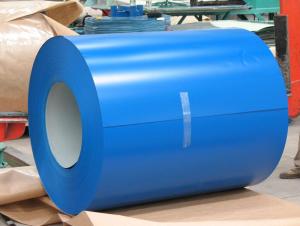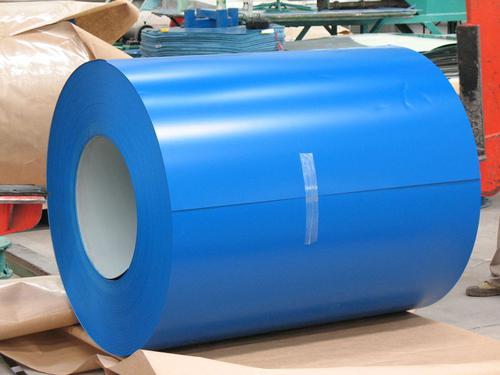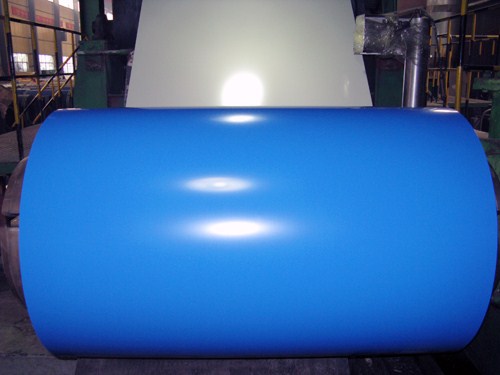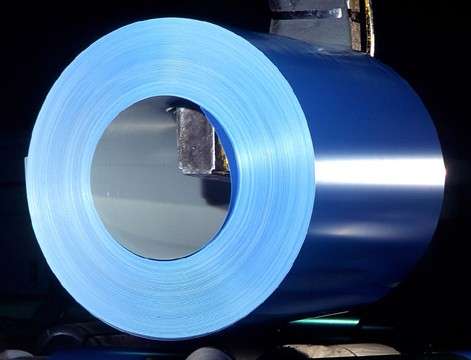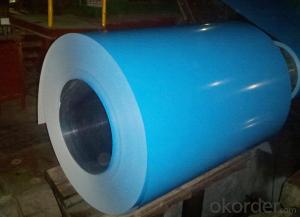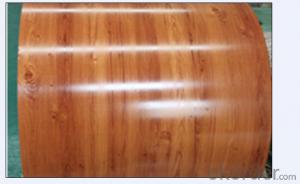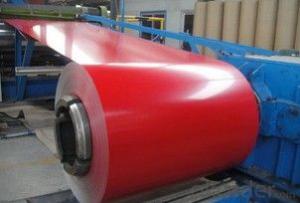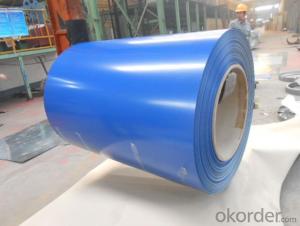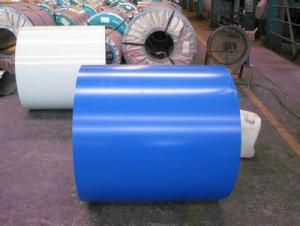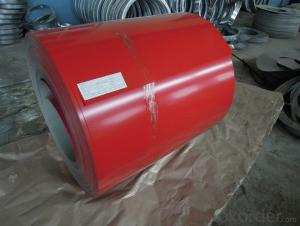Pre-Painted Galvanzied Steel Coil Ocean Blue
- Loading Port:
- Shanghai
- Payment Terms:
- TT OR LC
- Min Order Qty:
- 100 m.t.
- Supply Capability:
- 10000 m.t./month
OKorder Service Pledge
OKorder Financial Service
You Might Also Like
1. Pre-Painted Galvanized/Aluzinc Steel Coil Description:
With GI as base material, after pretreatment (degrease and chemical treatment ) and liquid dope with several layers of color, then after firing and cooling, finally the plate steel is called pre-painted galvanized (aluzinc) steel. Pre-painted galvanized steel is good capable of decoration, molding, corrosion resistance. It generally displays superior workability, durability and weather resistance.
2.Main Features of the Pre-Painted Galvanized/Aluzinc Steel Coil:
• Excellent process capability
• Smooth and flat surface
• Workability, durability
• Excellent heat resistance performance
• High strength
• Good formability
• Good visual effect
3.Pre-Painted Galvanized/Aluzinc Steel Coil Images
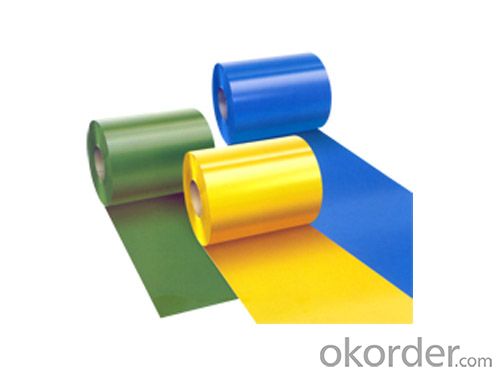
4.Pre-Painted Galvanized/Aluzinc Steel Coil Specification
Standard: AISI, ASTM, BS, DIN, GB, JIS
Grade: DX51D, DX52D
Thickness: 0.17-2.0mm
Brand Name: KMRLON
Model Number: coil
Type: Steel Coil
Technique: Cold Rolled
Surface Treatment: Coated
Application: Boiler Plate
Special Use: High-strength Steel Plate
Width: 20-1250mm
Length: customized
commoidty: pre-painted galvanized steel coil
Thickness: 0.13-4.0mm
width: 20-1250mm
zinc coating: 40-180g/m2
printing thickness: top side: 20+/-5 microns, back side: 5-7 microns
color: all RAL color
surface treatment: color coated
coil weight: 4-7 tons
coil ID: 508/610mm
packaging: standard seaworthy packing
5.FAQ of Pre-Painted Galvanized/Aluzinc Steel Coil
1. What’s the application of this product?
Roof, roof structure, surface sheet of balcony, frame of window, etc.
2. What’s the brand of the paint?
We use the best brand of all of the word—AKZO.
3. How to guarantee the quality of the products?
We have established the international advanced quality management system,every link from raw material to final product we have strict quality test;We resolutely put an end to unqualified products flowing into the market. At the same time, we will provide necessary follow-up service assurance.
4. How long can we receive the product after purchase?
Usually within thirty working days after receiving buyer’s advance payment or LC. We will arrange the factory manufacturing as soon as possible. The cargo readiness usually takes 15-25 days, but the shipment will depend on the vessel situation.
- Q: Is steel with a black coloring as strong as regular steel. if you are asking why i have two wordsBlack Katana.I know a katana is not made with normal steel, it is made of two types with varying grades of carbon to give it speacial properties, i just want to know if the black will make a difference.
- There are many types of steel some very rigid, while you can have steel that is very flexible. The type of katana: steel is for Samurai swords
- Q: i cant find this stuff about steel:conductivitystrengthcorrosion resistancecommon applicationsif you know of any interesting facts, i could use those 2!thanx!
- The strength and corrosion resistance depends on the mix. Pure steel is pure iron plus 6% pure carbon. It is the carbon molecules that give it a tough crystallized strength. Pure iron is wrought iron and you can bend that with your hands. Strength also depends on the shape of the beam the most common steel beam is the W flange more commonly called the I beam. That is because the strength of the ‘I’ beam is just a little bit less than if the entire I beam was filled in; however the weight and material savings is huge. Steel itself has no corrosion resistance and is often given a zinc coating just to resist oxidization. Manganese, vanadium and tungsten are just some of the other elements added to improve the steel.
- Q: I live in Dubai. I want to make a damascus steel sword and have no idea where to get the steel or what sort of steel I should get.First to adress the access of my steel...I need to get some low carbon and high carbon steel for the Damascus....what sort of steel is recommended for this? Also where would I be able to get my hands on it (Internet options e.g websites or locations)THANKS
- Damascus Steel Swords For Sale
- Q: How are steel coils inspected for surface cleanliness?
- Steel coils are inspected for surface cleanliness through a variety of methods including visual inspection, magnetic particle inspection, and ultrasonic testing. Visual inspection involves visually examining the surface for any visible contaminants or defects. Magnetic particle inspection uses magnetic fields and particles to detect surface defects such as cracks or flaws. Ultrasonic testing uses high-frequency sound waves to detect any subsurface defects or irregularities. These inspection methods ensure that the steel coils meet the required standards of cleanliness and quality.
- Q: How are steel coils used in the manufacturing of construction equipment?
- Steel coils are used in the manufacturing of construction equipment as they serve as a primary raw material for the fabrication of various structural components such as frames, bodies, and chassis. These coils are typically processed through cutting, bending, welding, and shaping techniques to create the necessary parts that provide strength, durability, and stability to construction machinery.
- Q: I am getting a barn soon and I was debating between wood, and steel. I think steel would look nicer [painted of course] and I was wondering which is cheaper. Any extra info would be great. Thanks x
- steel would be cheeper and last longer
- Q: How are steel coils annealed to improve their properties?
- Steel coils are annealed by heating them to a specific temperature and then slowly cooling them, which allows for the recrystallization of the steel. This process helps to relieve internal stresses, improve the material's ductility, and enhance its overall mechanical properties.
- Q: What are the safety regulations for steel coil production facilities?
- Safety regulations for steel coil production facilities vary depending on the specific country or region, but there are some common safety measures that are typically implemented in these facilities. One key safety regulation is the proper training and education of employees. All workers in steel coil production facilities should be trained on the potential hazards they may encounter, as well as the proper safety procedures to follow. This includes training on handling heavy machinery, operating cranes or forklifts, and understanding the risks associated with working in a high-temperature environment. Another important safety regulation is the maintenance and inspection of equipment. Regular inspections of machinery and equipment should be conducted to ensure they are in proper working condition and do not pose any safety risks. Furthermore, maintenance procedures should be implemented to address any issues or malfunctions promptly. Fire safety is also a crucial aspect of safety regulations in steel coil production facilities. Fire prevention measures such as the installation of fire alarms, sprinkler systems, and fire extinguishers should be in place. Regular fire drills should also be conducted to ensure that all employees are aware of the evacuation procedures and can respond quickly and effectively in case of a fire emergency. Personal protective equipment (PPE) is another vital safety requirement in steel coil production facilities. Employees should be provided with appropriate PPE such as safety glasses, helmets, gloves, and steel-toed boots to protect them from potential hazards such as falling objects, sharp edges, and high temperatures. Additionally, safety regulations often require the implementation of safety barriers and guards around machinery and equipment to prevent accidents and injuries. This includes safety gates, railings, and protective covers to restrict access to hazardous areas and prevent unauthorized entry. Regular safety audits and inspections should be conducted by relevant authorities or safety professionals to ensure compliance with safety regulations. Companies should also encourage a culture of safety by promoting open communication about safety concerns, providing safety training and refresher courses, and rewarding employees for their adherence to safety protocols. It is important to note that safety regulations may vary from one jurisdiction to another, and it is always advisable to consult the specific regulations applicable in the country or region where the steel coil production facility is located.
- Q: What are the different methods of coil packaging for steel coils?
- There are several different methods of coil packaging for steel coils, each with its own advantages and suitability for specific applications. Some of the common methods include: 1. Strapping: This method involves using steel or plastic strapping to secure the coil and prevent it from unwinding or shifting during transportation. Strapping can be done manually or with the help of strapping machines, offering a cost-effective and reliable packaging solution. 2. Stretch wrapping: Stretch wrapping involves using a stretch film to tightly wrap the coil. The film is stretched and wrapped around the coil, providing protection against dust, moisture, and damage. This method is suitable for lightweight coils and offers good visibility of the product. 3. Steel banding: Steel banding is a robust and heavy-duty packaging method that involves using steel bands to secure the coil. This method provides high strength and durability, ensuring that the coil remains intact during transportation or storage. 4. Edge protectors: Edge protectors are used in conjunction with other packaging methods to safeguard the edges of the coil. These protectors are typically made of cardboard or plastic and provide additional support to prevent edge damage. 5. Wooden crates: For heavy or fragile steel coils, wooden crates are often used to provide maximum protection. The coils are placed inside the crate and secured with strapping or steel banding. Wooden crates offer excellent strength and stability and can be customized to fit specific coil dimensions. 6. Paper interleaving: This method involves inserting layers of paper or cardboard between individual wraps of the coil to prevent scratching or marking. Paper interleaving is commonly used when the coils are stacked together or when they have a high surface finish that needs to be protected. 7. Automated packaging systems: In larger-scale operations, automated packaging systems can be utilized. These systems are designed to handle and package coils using various methods, such as strapping, stretch wrapping, or steel banding. They offer increased efficiency and productivity while ensuring consistent and secure packaging. The choice of coil packaging method depends on factors such as the size and weight of the coil, transportation requirements, level of protection needed, and cost considerations. It is essential to select the appropriate packaging method to ensure the safe delivery of steel coils to their destination.
- Q: Steel is strong in both tension and compression. Concrete is only strong in compression, and is very fragile in tension. Plus, concrete is heavy--a huge drawback in, say, a bridge deck. And its fairly expensive. And it hides the condition of the steel embedded within it. So what does it bring to the table? Why use it at all?
- As a composite material, reinforced concrete can be an economical alternative to structural steel in building, bridge and other superstructures. Reinforced concrete can be formed into almost any shape in the field. The bulk of reinforced concrete material - the aggregates - can often be produced local to a project, reducing manufacturing cost. Reinforced concrete weight can be a benefit, resisting loads that cause displacement, uplift and overturning.
Send your message to us
Pre-Painted Galvanzied Steel Coil Ocean Blue
- Loading Port:
- Shanghai
- Payment Terms:
- TT OR LC
- Min Order Qty:
- 100 m.t.
- Supply Capability:
- 10000 m.t./month
OKorder Service Pledge
OKorder Financial Service
Similar products
Hot products
Hot Searches
Related keywords
